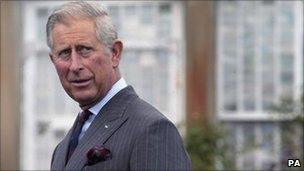Prince Charles's taxpayer funding and tax bill increase
- Published

The Prince of Wales's personal expenditure rose to more than £2.5m in the year
The Prince of Wales received an extra £298,000 in taxpayer funding last year but paid £914,000 more in tax.
Official accounts issued by Clarence House, external show Charles's tax bill rose 26% to £4.39m in the year to 31 March, partly due to the new 50% tax band.
Grants-in-aid and government income was up 18% to £1.96m, after an increase in travel spending for official duties.
Three new aides have been taken on to work for the Duke and Duchess of Cambridge and Prince Harry.
The figures are contained in the Annual Review 2011, which covers the activities of Charles and Camilla as well as William, Catherine and Harry.
It shows the prince's non-official expenditure rose £488,000 to £2,539,000, primarily because of an increase in personal donations to charity but partly to cover some expenses related to the royal wedding between the Duke and Duchess of Cambridge in April.
Any of the major costs of the royal wedding borne by Clarence House will be included in next year's accounts but specific details of that spending are not expected to be released.
The review reveals that William and Catherine's engagement in November resulted in a large increase in the number of letters received by Clarence House, from 24,616 to 35,968.
Air travel
Prince Charles's private income from his Duchy of Cornwall estate increased by almost 4% to £17.8m.
The full-time equivalent of 133 members of staff were employed to support Clarence House at the end of March this year, up from 124 in 2010.
Charles and Camilla travelled some 34,000 miles (54,700km) to and from official engagements in the year.
The prince's spokesman Paddy Harverson says the trips produce "a great return for the taxpayer"
The travel included more than 14,000 miles on overseas trips such as visits to India, where the prince opened the Commonwealth Games, as well as Portugal, Spain and Morocco, and 96 engagements with the armed forces at home and abroad.
The spending on official travel by air and rail totalled £1.08m, a 56% increase.
But the rise in costs was said to be because the major royal overseas trip in the previous year, to Canada, had been paid for by the Canadian government.
The Prince of Wales's principal private secretary Sir Michael Peat said: "That increase has nothing to do with us in that the prince and the duchess don't decide what overseas travel they do on behalf of the Foreign Office and the government."
The prince's spokesman Paddy Harverson told the BBC that Charles and Camilla's overseas trips achieved an "enormous amount".
"We are there to support British policy objectives, support British trade and commerce, help other governments with their issues in the environment, with inter-faith relations, youth employment," he said.
"We do believe, and the government believes, this is essential work that members of the Royal Family do."
Solar panels
The household's carbon emissions fell by 22% to 3,986 tonnes.
In 2010, Charles had 30 solar photovoltaic panels installed on the roof of his Clarence House residence in London, and 400 are currently being fitted at Home Farm at his Highgrove country home in Gloucestershire.
Electricity may be fed back into the National Grid, creating a new source of income, if the solar panels produce more power than is needed.
When inflation is taken into account income fell slightly because rent receipts were flat and the increase was largely the result of investments in bonds.
The review also reveals that in the year 2010-11:
The Prince of Wales and Duchess of Cornwall visited 102 towns and cities in the UK
They received 9,658 guests at royal residences
About half of their royal household's energy came from renewable sources
Prince Charles raised £123m for his charities
The official website for the Prince of Wales received 7.9 million page impressions
Anti-monarchy group Republic is demanding that revenue from the Duchy of Cornwall goes to the Treasury and has called on the House of Commons Public Accounts Committee to launch an inquiry into Charles's funding.
Graham Smith, from Republic, said: "Why on earth are taxpayers continuing to fund his lavish lifestyle when public services are being cut?"
- Published27 January 2011
- Published27 July 2010
- Published29 June 2010